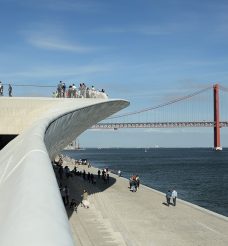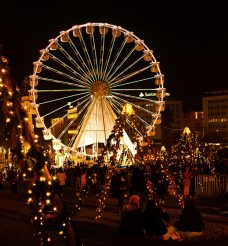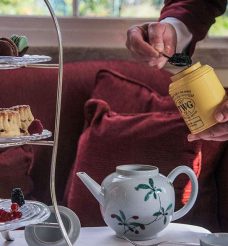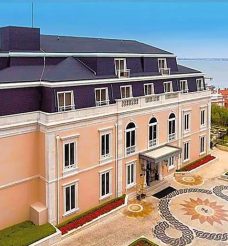
MAAT – Museum of Art, Architecture and Technology
Avenida Brasília, Central Tejo, 1300-598 Lisbon
Housed in the century-old power station that formerly held the Electricity Museum, Lisbon’s newest museum dedicated to contemporary art brings thought-provoking artistic and cultural proposals to the banks of the Tagus River.
This innovative museum is also a new public space for the city: in addition to the iconic Central Tejo building—an example of 20th-century industrial architecture—the MAAT extends to a neighboring structure with a wavy, minimalist design by London-based architecture studio Amanda Levete. The building’s rooftop is walkable and has become one of the most popular viewpoints overlooking the river and the city.
https://www.maat.pt/
Calouste Gulbenkian Museum
Av. de Berna, 45 A, 1067-001 Lisbon
Widely regarded as one of the best museums in Portugal, it features two distinct art collections housed in separate buildings connected by a magnificent garden. The museum showcases pieces spanning over two thousand years of art, from Ancient Egypt to contemporary works. Throughout the year, the museum also hosts temporary exhibitions, concerts, lectures, and guided tours.
http://www.gulbenkian.pt/
Museum of the Orient
Av. Brasília, Doca de Alcântara (North), 1350-352 Lisbon
Under the management of the Oriente Foundation, this cultural space is dedicated to the historical, cultural, and artistic relationships between Portugal and the countries of the East.
Its permanent exhibition features two main collections: “Portuguese Presence in Asia”, showcasing the material evidence of ties between Portugal and the East since the 15th century, and “Shadows of Asia”, presenting one of the many ethnographic collections from the Kwok-On collection, focused on traditional Asian cultural practices, covering regions such as India, Indonesia, Thailand, China, and Japan. Temporary exhibitions, workshops, and educational activities are also regularly held.
http://www.museudooriente.pt/
National Tile Museum (Museu Nacional do Azulejo)
Rua da Madre de Deus, 4, 1900-312 Lisbon
Located in the former Madre de Deus Convent, founded in 1509 by Queen Leonor, this unique museum celebrates one of Portugal’s most distinctive art forms: the azulejo (tile).
Its permanent and temporary exhibitions highlight this quintessential expression of Portuguese culture. The museum also includes a café with a garden terrace, a shop, a library, and an educational service.
http://www.museudoazulejo.gov.pt/
National Coach Museum (Museu Nacional dos Coches)
Av. da Índia, 136, 2715-311 Lisbon
Home to a world-unique collection of ceremonial and traveling vehicles from the 16th to the 19th centuries, the museum moved to its current building in May 2015, a space designed by architect Paulo Mendes da Rocha, near the original location. Visitors can admire around 70 beautiful historic carriages.
http://www.museudoscoches.pt/
Fado Museum (Museu do Fado)
Lg. Chafariz de Dentro, 1, Alfama, 1100-139 Lisbon
This museum tells the story of Fado, a unique musical genre and a symbol of Lisbon’s identity. Its permanent exhibition explores the history of Fado through visual arts, sheet music, repertoires, and musical instruments. The museum also hosts temporary exhibitions, seminars, concerts, and more.
http://www.museudofado.pt/
National Museum of Ancient Art (Museu Nacional de Arte Antiga)
Rua das Janelas Verdes, 1249-017 Lisbon
Known locally as the Janelas Verdes Museum, this is Portugal’s most important collection of national and international artworks, including the largest number of items classified as “national treasures” by the state.
http://www.museudearteantiga.pt/
Maritime Museum (Museu de Marinha)
Praça do Império, 2715-311 Lisbon
Located in the north and west wings of the Jerónimos Monastery, this museum is recognized by the large black anchor at its entrance. It is dedicated to Portugal’s naval history and maritime achievements, with exhibits covering the entire history of Portuguese exploration across the world’s oceans.
The museum also promotes marine research and educational activities.
http://museu.marinha.pt
MNAC – National Museum of Contemporary Art – Chiado Museum
Rua Serpa Pinto, 4, 1200-444 Lisbon
Located in Lisbon’s historic center, this museum was founded in 1911 and fully renovated in 1994 by French architect Jean-Michel Willmotte, with further expansion in 2015.
Its permanent collections document Portuguese artistic production from 1850 to the present, representing the most important state-owned collection of modern and contemporary art in Portugal.
http://www.museuartecontemporanea.pt/
Lisbon Museum – Palácio Pimenta
Campo Grande, 245, 1700-091 Lisbon
Ideal for anyone wanting to learn more about Lisbon’s history. Housed in an 18th-century summer palace, it features a wide-ranging collection—archaeology, drawings, paintings, prints, and sculptures—that illustrates different stages of the city’s evolution in urban, economic, political, social, and cultural aspects.
http://www.museudelisboa.pt/
Belém Cultural Center (Centro Cultural de Belém)
Praça do Império, 1449-003 Lisbon
Known as CCB, this major cultural hub in Belém was inaugurated in 1992 and has since become a landmark for arts and entertainment in Portugal.
It hosts the Berardo Collection Museum—an important modern and contemporary art museum—along with performance venues, meeting spaces, two terrace restaurants, a café, shops, and landscaped gardens.
http://www.ccb.pt
Money Museum (Museu do Dinheiro)
Former Church of S. Julião, Largo de S. Julião, 1100-150 Lisbon
Created by the Bank of Portugal, the Money Museum explores the theme of money and its history.
Housed in the 18th-century Church of São Julião, the museum blends historical ambiance with modern multimedia and interactive exhibits, offering a fresh and engaging visitor experience.
http://www.museudodinheiro.pt/destaques
National Costume Museum (Museu Nacional do Traje)
Largo Júlio de Castilho, Lumiar, 1600-483 Lisbon
This museum holds a collection of national and international clothing and fashion accessories from the 18th century to today, displayed through both permanent and temporary exhibitions. It is housed in a former 18th-century country estate, featuring the expansive Monteiro-Mor Park, open to the public.
http://www.museudotraje.gov.pt/pt-PT/Default.aspx
Puppet Museum (Museu da Marioneta)
Convento das Bernardas – Rua da Esperança, nº 146, 1200-660 Lisbon
Located in the beautiful building of the Convent of the Bernardas in Santos-o-Velho, this is the first and only museum in Portugal entirely dedicated to the history and art of puppetry. Founded in 1987, its collection includes puppets from around the world and continues to grow thanks to contributions from collectors.
http://www.museudamarioneta.pt/
National Museum of Natural History and Science
Rua da Escola Politécnica 56/58, 1250-102 Lisbon
This museum promotes public curiosity and understanding of nature and science. It comprises several historically significant spaces—some already classified as national monuments—including the Botanical Garden, Astronomical Observatory, Chemical Laboratory, and the former Royal Riding School of the College of Nobles.
http://www.museus.ulisboa.pt/







